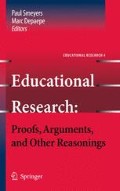Abstract
Education is marked by continuity in thoughts and approach mostly (Depaepe, 1998). It nevertheless also bears in it the tendencies of its time. The education of the 19th and 20th centuries’ children was marked by upcoming educationalization (Depaepe, 1998) and medicalization (Petrina, 2006). Although these tendencies are still present today, as continuity is education’s main feature, there is also the upcoming trend of technologization. Education has inevitably become highly technological in the era of information and communication technology (ICT) in life in general. At school, computers and the Internet are being introduced in more and more classes to support subject learning. Teachers do their best to keep up to date with ICT, while in the home parents are urged to reflect upon how to integrate ICT in the education of their children too.
Access this chapter
Tax calculation will be finalised at checkout
Purchases are for personal use only
Notes
- 1.
Prieviously published in Ethics and Education, Volume 3, Issue 2 October 2008, pp. 121–134 (reprinted with permission of the editor, Richard Smith).
References
Abbs, P., et al. (2006). Modern life leads to more depression among children. The Daily Telegraph — 2006, http://www.telegraph.co.uk/news/1528639/Modern-life-leads-to-more-depression-among-children.html (accessed December 23, 2006).
Arcilla, R. (2006). Perfectionism’s educational address. Paper presented at conference on Cavell, Cambridge, MA.
Byron, T. (2008). Safer children in a digital world. The report of the Byron review. Nottingham: DCSF Publications.
Cavell, S. (1999). The claim of reason. Wittgenstein, skepticism, morality, and tragedy. Oxford: University Press.
Conrad, P. (1992). Medicalization and social control. Annual Review of Sociology, 18, 209–232.
Couchman, G. W. (1983, Autumn). Miscellany. An informal survey. Parenting – American Speech, 58, 285–288.
Depaepe, M. (1998). De pedagogisering achterna. Aanzet tot een genealogie van de pedagogische mentaliteit in de voorbije 250 jaar. Leuven: Acco.
Dreyfus, H. L. (1998). Why we do not have to worry about speaking the language of the computer. Information Technology and People, 11, 281–289.
Dreyfus, H. L. (2001). On the internet. London: Routledge.
Feenberg, A., Higgs, E., Strong, D., & Light, A. (Eds.). (2000). From essentialism to constructivism: Philosophy of technology at the crossroads. Technology and the good life (pp. 294–315). Chicago: University Press. http://www-rohan.sdsu.edu/faculty/feenberg/talk4.html (accessed November 20, 2006)
Fenton, B. (2006). Junk culture ‘is poisoning our children’. The Daily Telegraph – 2006, http://www.telegraph.co.uk (accessed December 23, 2006)
Heidegger, M. (1993). The question concerning technology. In D. F. Krell (Ed.), Martin Heidegger. Basic writings (D. F. Krell, Trans., pp. 311–341). London: Routledge. (original work published 1954)
Introna, L., & Zalta, E. N. (Eds.). (2005) Phenomenological approaches to ethics and information technology. The stanford encyclopaedia of philosophy. Stanford: Stanford University. http://plato.stanford.edu/archives/spr2005/entries/ethics-it-phenomenology/(accessed November 22, 2005)
Lambeir, B. (2004). The educational cyberspace affaire. A philosophical reading of the relevance of information and communications technology for educational theory. Unpublished doctoral dissertation, KU Leuven, Faculty of Psychology and Educational Sciences, Department of Pedagogical Sciences, Centre for Philosophy of Education, Leuven
Lambeir, B., & Ramaekers, S. (2007). The terror of explicitness. Philosophical remarks on the idea of a parenting contract. Ethics and Education, 2, 95–108.
Lingis, A. (1994). The community of those who have nothing in common. Bloomington: Indiana University Press.
Mulhall, S. (1996). Knowing and acknowledging. In S. Mulhall (Ed.), The Cavell reader (pp. 47–71). Cambridge: Blackwell.
Noddings, N. (2003). Caring: A feminine approach to ethics and moral education. Berkeley: University of California Press.
Pardoen, J., & Pijpers, R. (2005). Mijn kind online: hoe begeleid je je kind op Internet? Amsterdam: SWP.
Pardoen, J., & Pijpers, R. (2006). Mijn kind online. Hoe begeleid je je kind op Internet? Amsterdam: SWP. Parenting, http://www.allwords.com (accessed November 26, 2007)
Petrina, S. (2006). The medicalization of education: A historiographic synthesis. History of Education Quarterly, 46, 503–531.
Pirsig, R. M. (1974). Zen and the art of motorcycle maintenance: An inquiry into Values New York: William Morrow.
Sennett, R. (2008). The craftsman. London: Allen Lane.
Smith, R., (2006). Technical difficulties: The workings of practical judgement. In P. Smeyers & M. Depaepe (Eds.), Educational research: Why ‘what works’ doesn’t work (pp. 159–170). Dordrecht: Springer.
Suissa, J. (2006). Untangling the mother knot: Some thoughts on parents, children and philosophers of education. Ethics and Education, 1, 65–77.
Van den Boomen, M. (2000). Leven op het net. De sociale betekenis van virtuele gemeenschappen. Amsterdam: Instituut voor publiek en politiek.
Wintour, P. (2008, March 27). Parents to be shown how to protect children online. New codes of practice for social network sites and video games. The Guardian, pp. 1–2.
Wubs, J. (2004). Luisteren naar deskundigen. Opvoedingsadvies aan Nederlandse ouders 1945–1999. Assen: Van Gorcum.
Author information
Authors and Affiliations
Corresponding author
Editor information
Editors and Affiliations
Rights and permissions
Copyright information
© 2009 Springer Science+Business Media B.V.
About this chapter
Cite this chapter
Smedts, G. (2009). Parenting in a Technological Age. In: Smeyers, P., Depaepe, M. (eds) Educational Research: Proofs, Arguments, and Other Reasonings. Educational Research, vol 4. Springer, Dordrecht. https://doi.org/10.1007/978-90-481-3249-2_6
Download citation
DOI: https://doi.org/10.1007/978-90-481-3249-2_6
Published:
Publisher Name: Springer, Dordrecht
Print ISBN: 978-90-481-3248-5
Online ISBN: 978-90-481-3249-2
eBook Packages: Humanities, Social Sciences and LawEducation (R0)

